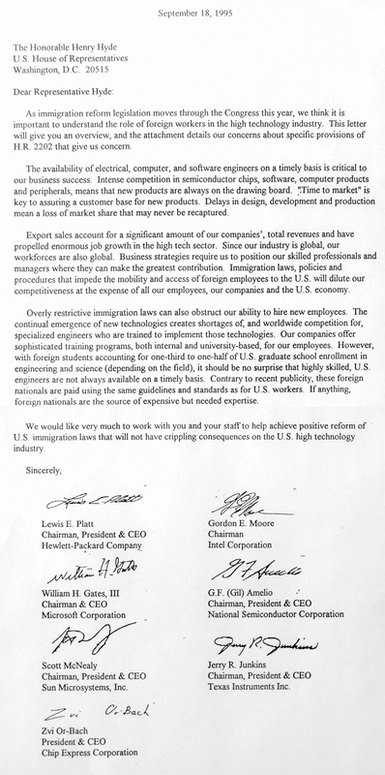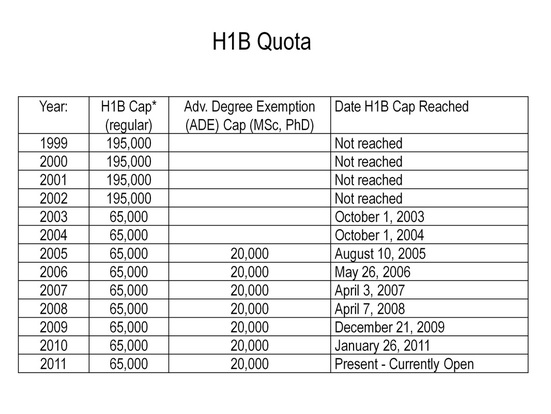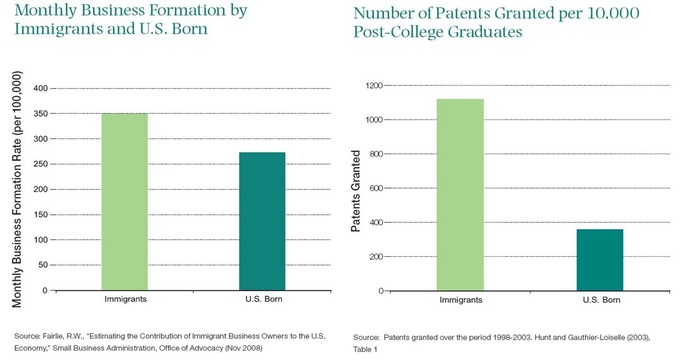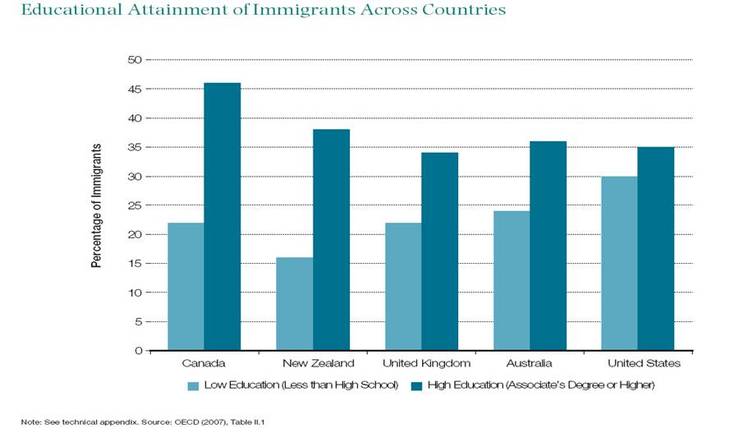
We have a guest contribution today from Zvi Or-Bach, President and CEO of MonolithIC 3D Inc. In this blog-post, Zvi discusses a topic he is passionate about: immigration policy for the United States.
In the September of 1995, I was honored to join Gordon Moore of Intel and Bill Gates of Microsoft in a letter to Congress to express concerns about specific provisions of H.R. 2202 - an immigration reform legislation that was moving through Congress to reduce the number of H1 visas.
The prevailing view in the general public is that immigration is bad, as foreigners take away jobs that otherwise would be available to US citizens. And especially in bad times when unemployment is high, like these days, such a view becomes even more dominant. It is not surprising that soon after the "Tech Bubble" burst, Congress reduced the cap for H1B visas from 195,000 to 65,000.
But the truth is just the opposite. Talent is the number one force in job and wealth creation, especially in high tech.
Quoting from George Gilder's book - The Israel Test:
"Forty some years on, Israel by 1990 was still mostly barren of technology and finance"...
"At least as important to Israel's technology sector, however, was the fact that beginning in the late 1980s, the country committed itself to absorb close to a million immigrants, chiefly from the former Union of Soviet Socialist Republics (USSR),...represented a 25 percent population increase over a period of five years"...."In a decade, it went from being a nondescript laggard in the industrial world to become a luminous first. Today, on a per-capita basis, Israel far leads the world in research and technological creativity...By 1999, Israel ranked second only to the United States in invested private equity capital as a share of GDP. With 70 percent of its growth attributable to high-tech venture, by this measure, Israel went in twenty years from last among all industrial countries to lead the world."
These achievements allowed Israel to change its balance of trade to positive, strengthen its currency to the point that it was among the first to come out of the last crisis, and raise its interest rate multiple times since then. Currently the Israel's central bank interest rate stands at 3.5%, while its currency strengthened against the dollar since 2009 by about 10%.
And we can look at our own data as shown by the following charts from the Brookings Institution:
"Of the 35 young innovators recognized this year by Technology Review magazine for their exceptional new ideas, only six went to high school in the United States. From MIT alone, foreign graduates have founded an estimated 2,340 active U.S. companies that employ over 100,000 people.
Amazingly, if as incoming students they had told U.S. immigration authorities that they hoped to stay on as entrepreneurs after graduation, they would have been turned back at the border. Our immigration laws specifically require that students return to their home countries after earning their degrees and then apply for a visa if they want to return and work in the U.S. It would be hard to invent a policy more counterproductive to our national interest."
Our current immigration law has a visa program, known as EB-5. The 21-year-old initiative makes 10,000 green card available to foreigners who invest a minimum of $500,000 in U.S. companies that “create or preserve at least 10 jobs in the country"
This reminds me of the old saying: "Give a man a fish and you have fed him for today. Teach a man to fish and you have fed him for a lifetime". T. J. Rodgers, president and CEO of Cypress Semiconductor, said as much in his 1998 letter to the Wall Street Journal: "Our immigrant executives, directors and engineers have created thousands of new American jobs."
We need to amend our attitude toward the tens of thousands of highly talented students and employees living here today on temporary visas and replace it with an invitation for the best minds of the world to come here to stay. We need to form a special fast-track route to green cards for those that demonstrate outstanding know-how, skills, and talent.
Simple criteria could be quickly established. For example any foreign student that graduates at one of our high ranking schools, in any of the high tech fields, at the top 20% of his class should be fast-tracked for a green card. And a similar criterion could be established for those who work in the high tech field on temporary visas.
The US was once a technological world leader far ahead of anybody else. But as many of the people who been trained here went back to their home countries, we are seeing this leadership come under extreme pressure from foreign nations. We should act now to resume our leadership. We just need to be courageous to act.













 RSS Feed
RSS Feed